It is common to reflect on the past year and make changes at this time. Why not make this year the year you improve and change your diet?
Healthy eating is something we all know, but may not be able to put into practice. Here are 10 simple and effective ways to improve your diet.
1. Fruit and vegetables are good for you
It may be something you’ve heard a hundred times, but the best dietary habit is to eat more fruit and vegetables every day. Fruits and vegetables are rich in vitamins, minerals, and anti-oxidants, including carotenoids and vitamin C. The more variety you have in your diet, the greater the number of nutrients that you’ll receive. Think of a colourful plate – broccoli, bananas or green apples are all good choices. You don’t need to eat them ‘straight.’ Try them in salads or smoothies. Or, add them to soups.
2. Reduce your saturated fat consumption
Saturated fats are widely believed to be a cause of heart disease. They increase the harmful cholesterol levels in the body, while reducing the beneficial cholesterol. Animal fats make up the majority of saturated fats. Reduce your consumption of saturated fats by choosing lean meat cuts, trimming off visible fat and avoiding dairy products high in fat. Try to avoid using meat as your main source of protein and replace it with pulses or another vegetable-based product.
3. Reduce your trans fat intake
Trans-fats, which are chemically modified fats, are thought to be just as bad for your health as saturated fats. These are often used by fast food companies and large food producers. If you avoid these and other processed foods, such as cookies and cakes, you can help to reduce their intake. Trans-fats are not found in nature.
4. Increase your intake of unsaturated fat
Unsaturated fatty acids reduce harmful cholesterol levels in the bloodstream. Some even boost the protective cholesterol levels. Unsaturated fats are found in avocados, nuts, seeds and olive oil.
5. Omega-3 Oil: Increase your intake
Omega-3 oil is a powerful anti-inflammatory agent that can protect the heart and joints. It may also help maintain mental health. They are found in oily fish, such as mackerel, sardines and herring. Oily fish contains more of these oils than plant-based sources. Two portions of omega-3-rich foods per week are recommended.
6. Drink more fluids
Drink around eight glasses of liquid per day. Water is essential for good health. After all, 60% of the body’s weight is water. The majority of metabolic reactions within the body require water. Dehydration may cause fatigue, poor concentration and even affect your appearance. You can reach your hydration goal by re-filling water bottles several times during the day.
7. Breakfast every day
Breakfast eaters tend to be thinner than those who skip breakfast. You can have a wide variety of breakfast foods: porridge, toast, cereals and fruit, as well as black/green/herbal/black tea, pancakes with berries or tomatoes, rice cakes and peanut butter. Avoid eating fried foods, sugary breakfasts, or breakfasts that are heavy on meat and sugar.
8. Wholegrain is the best way to go
People who have healthier hearts tends to consume more whole grains.
It is not clear if this is due to a healthy lifestyle in general or if it is due specifically to the properties of whole grain. However, whole grains contain more nutrients due to their inclusion of germ and bran. Whole grains contain insoluble and soluble fibre, phytonutrients and vitamins E and B.
9. Salt intake should be monitored
Excessive salt consumption can lead to hypertension, which can then cause other health problems such as blood clots. Salt isn’t found in most foods or in the kitchen. It is mostly hidden in processed foods and snacks, such as soups in cans and ready-to-eat meals. Reduce your consumption of these foods to reduce your salt intake.
10. Fiber is important for your health.
You will increase your fibre intake when you eat more fruits, vegetables, and whole grains. If you also add legumes and pulses, you’ll be sure to reach the recommended 18g per day. Fibre can help protect you against constipation, diverticulosis, and bowel cancer. Drink plenty of fluids to help keep your bowels moving.
Get a balanced diet
You should strive to improve your diet by consuming a balanced, varied food intake that is rich in fruit and vegetables, is based upon whole grains and includes high-quality proteins such as lean beef or beans. In addition, you should use ‘good fats’ instead of ‘bad fats’ and limit the amount of sugary and salted snacks. After reading our 10 top tips on healthy eating, you now know what it really means. Why not put these tips into practice in the coming year?




